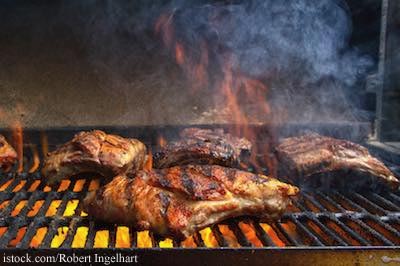If you’re hosting a Labor Day barbecue, remember these food safety tips from the U.S. Department of Agriculture (USDA). Properly preparing and cooking food reduces the risk of food poisoning.
 Are you planning to marinate your meat? If so, do it in the fridge, not on the counter, and take care to clean up any spills. If you want to use some marinade for sauce, reserve some when you make it. Never re-use the marinade of raw meat as sauce for the cooked meat.
Are you planning to marinate your meat? If so, do it in the fridge, not on the counter, and take care to clean up any spills. If you want to use some marinade for sauce, reserve some when you make it. Never re-use the marinade of raw meat as sauce for the cooked meat.
If you plan to partially cook meat or poultry inside and then finish it on the grill to reduce grilling time, do this right before you are ready to put it on a hot grill. This will reduce bacterial growth.
Prevent cross contamination by using different plates and utensils for raw meat and cooked meat. If you only have one set of dishes and utensils, wash them in hot, soapy water before putting the cooked meat on the platter.
Using a food thermometer is the only way to tell when meat is cooked properly. Cook meat, poultry and fish to the following temperatures: fish and whole cuts of pork and beef including steaks, roasts and chops that are not mechanically tenderized and have not been scored should be cooked to 145˚ F. Scored or mechanically tenderized cuts of beef and pork, ground meat, and egg dishes should be cooked to 160˚F. Poultry, including whole birds; pieces, such as breasts, wings and tenderloins; and ground turkey or chicken should be cooked to 165˚F.




